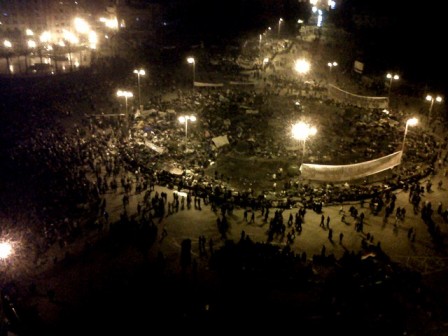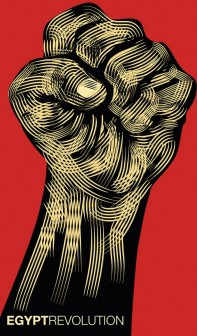Egypt After Mubarak: The Army Should Only Be The Revolution’s Guarantor

NEWS JUNKIE POST
Feb 11, 2011 at 11:54 amOn Friday, the only possible outcome of the Egyptian revolution occurred: A peaceful military coup deposing Hosni Mubarak. Dictator Mubarak has finally step down, and at this juncture it seems that his Vice President, Omar Suleiman, will be largely sidelined in the transition process. A military council will sack the cabinet, dissolve the parliament and is supposed to rule with the supreme constitutional court. A defeated Omar Suleiman made the announcement of the handover of power on state run television.
“Taking into consideration the difficult circumstances the country is going through, President Hosni Mubarak has decided to leave the post of president of the republic, and has asked the Supreme Council of the Armed Forces to manage the state’s affairs,” said a grim-faced Suleiman.
On Tahrir Square, the focal point of the revolution for the past three weeks, hundreds of thousands of Egyptian protesters expressed their pure elation by waving flags, crying and cheering when the dictator’s resignation was announced. However, just like in Tunisia, the revolution is now under the control of the military. In both cases, the revolutions can still lead to a dead end unless they keep building their respective momentum, and ultimately build their foundations on democratic legitimacy. In Tunisia and Egypt, the people must keep an extremely vigilant eye on their respective armed forces to make sure that they only act as the guarantors of the revolution during this transition period. Another risk to the Egyptian revolution is also some potential conflicting meddling coming from both Washington and Tehran.
Mubarak’s dictatorial regime was brought down by an eclectic and organic coalition of hundreds of thousands of protesters, who found a way to organize on Facebook and Twitter, as well as opposition politicians. From this largely leaderless mass protests, a few key figures are starting to emerge. One of them is Wael Ghonim, a 30-year old Google executive, whose social media expertize helped fuel the demonstration. Yet, Ghonim doesn’t see himself as a leader, but merely as a catalyst. Two days after his February 7 release from jail, Ghonim told the people in Tahrir Square that he wasn’t a hero. “I am not a hero. You are all heroes, the martyrs who have died in the struggle are the real heroes,” said Ghonim referring to the more than 300 people killed during Egypt’s uprising.
The other figure-not as closed to the protesters as Ghonim at least in term of generation- who could play a big part in Egypt’s future is Nobel prize winner Dr.ElBaradei. ElBaradei, in an interview with El Arabya, has just stated that he has no intention to run for president, but he is however sending mixed signals about his political ambitions as he seems to be on the fence over the matter. On Thursday, Dr. ElBaradei wrote an oped piece in the New-York Times in an effort to define what should be next for Egypt’s revolution. What the Egyptian revolution needs now is a few strategists, and Dr. ElBaradei should play his role as one of them.
“The new leaders will have to guarantee the rights of all Egyptians. They will need to dissolve the current parliament, no longer remotely representative of the people. They will also need to abolish the Constitution, which has become an instrument of repression, and replace it with a provisional constitution, a three-person presidential council and a transitional government of national unity,” wrote ElBaradei.
Dr. ElBaradei thinks that the three persons presidential council should include only one member of the military. In an interview with NPR news this morning, an emotional ElBaradei described today as “the best day of his life”. February 11, 2011 will be the best day in millions of Egyptians’ lives, but to keep the revolution alive the Egyptian people must keep the pressure up, and make sure that nobody try to hijack the revolution. Dr. ElBaradei, despite his apparent lack of charisma, should play an active part in this process.
Related Articles
- February 6, 2011 Will The Secular Arab Revolution’s Domino Effect Reach Iran?
- March 4, 2011 Arab Revolution: Is Iraq Next?
- April 10, 2011 Egypt’s Unfinished Business and a Lesson For the Arab Revolution
- January 31, 2011 Toppling Of Mubarak: A Chance For Peace In The Middle East
- January 30, 2011 Arab People: From Powerless To Proud
- January 24, 2011 Tunisia, WikiLeaks And Food Crisis: Forces For A Global Revolution















2 Responses to Egypt After Mubarak: The Army Should Only Be The Revolution’s Guarantor
You must be logged in to post a comment Login